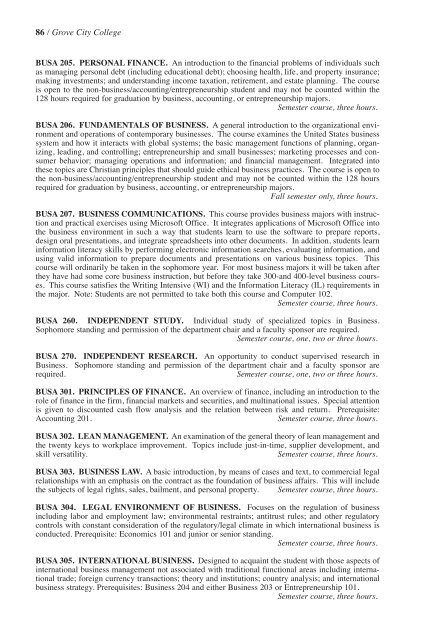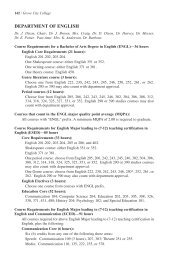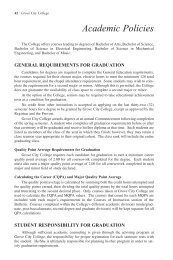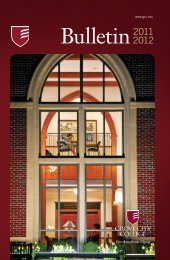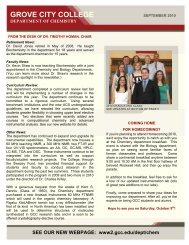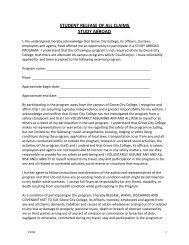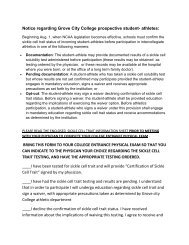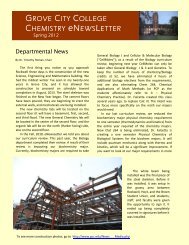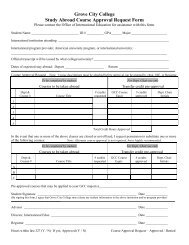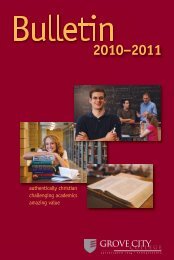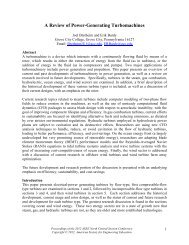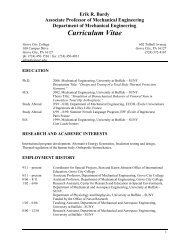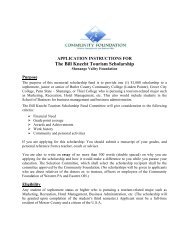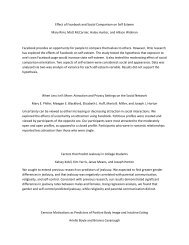2009–2010 - Grove City College
2009–2010 - Grove City College
2009–2010 - Grove City College
You also want an ePaper? Increase the reach of your titles
YUMPU automatically turns print PDFs into web optimized ePapers that Google loves.
86 / <strong>Grove</strong> <strong>City</strong> <strong>College</strong><br />
BUSA 205. PERSONAL FINANCE. An introduction to the financial problems of individuals such<br />
as managing personal debt (including educational debt); choosing health, life, and property insurance;<br />
making investments; and understanding income taxation, retirement, and estate planning. The course<br />
is open to the non-business/accounting/entrepreneurship student and may not be counted within the<br />
128 hours required for graduation by business, accounting, or entrepreneurship majors.<br />
Semester course, three hours.<br />
BUSA 206. FUNDAMENTALS OF BUSINESS. A general introduction to the organizational environment<br />
and operations of contemporary businesses. The course examines the United States business<br />
system and how it interacts with global systems; the basic management functions of planning, organizing,<br />
leading, and controlling; entrepreneurship and small businesses; marketing processes and consumer<br />
behavior; managing operations and information; and financial management. Integrated into<br />
these topics are Christian principles that should guide ethical business practices. The course is open to<br />
the non-business/accounting/entrepreneurship student and may not be counted within the 128 hours<br />
required for graduation by business, accounting, or entrepreneurship majors.<br />
Fall semester only, three hours.<br />
BUSA 207. BUSINESS COMMUNICATIONS. This course provides business majors with instruction<br />
and practical exercises using Microsoft Office. It integrates applications of Microsoft Office into<br />
the business environment in such a way that students learn to use the software to prepare reports,<br />
design oral presentations, and integrate spreadsheets into other documents. In addition, students learn<br />
information literacy skills by performing electronic information searches, evaluating information, and<br />
using valid information to prepare documents and presentations on various business topics. This<br />
course will ordinarily be taken in the sophomore year. For most business majors it will be taken after<br />
they have had some core business instruction, but before they take 300-and 400-level business courses.<br />
This course satisfies the Writing Intensive (WI) and the Information Literacy (IL) requirements in<br />
the major. Note: Students are not permitted to take both this course and Computer 102.<br />
Semester course, three hours.<br />
BUSA 260. INDEPENDENT STUDY. Individual study of specialized topics in Business.<br />
Sophomore standing and permission of the department chair and a faculty sponsor are required.<br />
Semester course, one, two or three hours.<br />
BUSA 270. INDEPENDENT RESEARCH. An opportunity to conduct supervised research in<br />
Business. Sophomore standing and permission of the department chair and a faculty sponsor are<br />
required. Semester course, one, two or three hours.<br />
BUSA 301. PRINCIPLES OF FINANCE. An overview of finance, including an introduction to the<br />
role of finance in the firm, financial markets and securities, and multinational issues. Special attention<br />
is given to discounted cash flow analysis and the relation between risk and return. Prerequisite:<br />
Accounting 201. Semester course, three hours.<br />
BUSA 302. LEAN MANAGEMENT. An examination of the general theory of lean management and<br />
the twenty keys to workplace improvement. Topics include just-in-time, supplier development, and<br />
skill versatility. Semester course, three hours.<br />
BUSA 303. BUSINESS LAW. A basic introduction, by means of cases and text, to commercial legal<br />
relationships with an emphasis on the contract as the foundation of business affairs. This will include<br />
the subjects of legal rights, sales, bailment, and personal property. Semester course, three hours.<br />
BUSA 304. LEGAL ENVIRONMENT OF BUSINESS. Focuses on the regulation of business<br />
including labor and employment law; environmental restraints; antitrust rules; and other regulatory<br />
controls with constant consideration of the regulatory/legal climate in which international business is<br />
conducted. Prerequisite: Economics 101 and junior or senior standing.<br />
Semester course, three hours.<br />
BUSA 305. INTERNATIONAL BUSINESS. Designed to acquaint the student with those aspects of<br />
international business management not associated with traditional functional areas including international<br />
trade; foreign currency transactions; theory and institutions; country analysis; and international<br />
business strategy. Prerequisites: Business 204 and either Business 203 or Entrepreneurship 101.<br />
Semester course, three hours.


